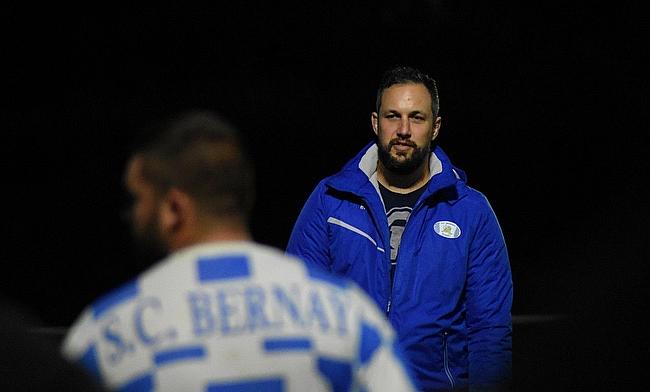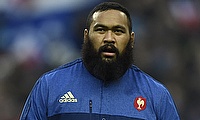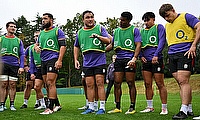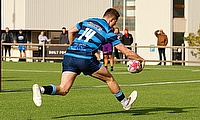Harry Spencer Interview: Why the RFU's decision to focus on the tackle height changes in France is puzzling

Former Saracens lock Harry Spencer coaches SC Bernay in the lower levels of French club rugby
©Eveil normand
Much has happened since the Rugby Football Union first announced that they were lowering tackle height to the waist and below for the 2023-24 season.
Last week alone, the governing body issued two statements. The first was to double down on their decision based on scientific evidence before the second arrived on Friday afternoon. It was an apology and a promise to work with stakeholders on what community rugby will look like moving forward.
But while the RFU has been the lead act in the foreground, the background has seen plenty of unrest. Grassroots clubs have successfully lobbied for a special general meeting - with the RFU potentially facing a vote of no-confidence - while calls for Bill Sweeney, the union’s Chief Executive Officer, to depart have only intensified.
On Friday morning, The Times published that the RFU Council – the body which voted for the changes – claimed they had been ‘misled into voting for the change’, with there reportedly being no reference to ‘waist and below’ in the deliberations.
Furthermore, it emerged that only 49 of the 66 RFU Council members were present at the Monday 16th January meeting, although it was presented as a ‘unanimous’ decision.
Despite the never-ending waves of anger lapping at the door, the RFU opted to post the scientific data alongside their apologetic statement.
This maintained that the changes they are looking to implement are in the best interest of player safety. It also referenced a French trial where they had lowered the tackle height in 2019, and the evaluation of these findings was presented at the World Rugby Medical Commission Conference at the end of 2022.
Sharing links to outline their rationale and scientific findings, the RFU have opened the door to their thinking behind lowering tackle height, and the study which was undertaken in France closely mirrored what is being proposed from the new season onwards.
Already, Talking Rugby Union has spoken to Luke Cozens, a current Clifton RFC fly-half, who both played and coached Le Havre when the trial was introduced in France.
Cozens’s former Rouen Normandie Rugby teammate Harry Spencer is still coaching across The Channel. Working with community club SC Bernay in Normandy, the former lock forward has seen much of the debate online and echos some of Cozens's doubts on the findings from the French study.
“When I see using the French trial as an example, firstly in terms of the application of their new rule, it hasn’t been constant throughout the last couple of years and then it’s progressively regressed to almost the level it was at before,” Spencer said.
“That’s been fine. That hasn’t really had an impact on the game. In terms of the analysis of concussions and of the impact that this change has had, I have never seen any of that at my level.
“I am at the regional level where you only have a referee, you don’t have linesmen, you have a match official who is there, so I can’t see from my experience that this trial has been analysed in any kind of extensive way.
“I don’t know how they got any of the data or how they are confident in the data they have got. The last game I had, someone got knocked out, got a concussion, stayed on the pitch. We protested and it was the other team’s player. He was staggering around, and the referee said, ‘I am not going to make a decision on that’.
“The other team took him off and then put him back on later in the game. In terms of concussion behaviour, it hasn’t really changed anything.
“I think the French are slightly motivated to prove that what they’ve trialled is good. I haven’t seen any negative data from the French study, which is bizarre. I haven’t seen any negative impacts as if something that they have put in place with very little communication and very little preparation has had only positive effects.
“For me in France, there is a lot of question marks over it. The rule change has not been constant. It has almost reverted back to before. It has been a mess and we’re all just about recovering from it now.”
At Spencer’s level, the main focus for referees is that the tackler should be targeting below the ball. Any higher and the whistle is blown, a pre-match chat is enough to indicate what most officials are looking for with the law variations.
That rise in tackle height is less to do with instruction from the FFR [French Rugby Federation] but a natural leniency which developed after the trial’s initial struggles, as well as a discourse similar to what England is experiencing at present following the RFU’s announcement nearly two weeks ago.
“The main resistance against it was very similar to the UK,” Spencer said. “That quickly turned into ‘why are we doing that?’. We eventually got it out of the FFR that they want to avoid situations where both heads of the tackler and ball carrier are at the same level. That’s quite understandable.
“What really happened was that a lot of the referees took this on board and the height of tackles, allowed tackles, gradually went higher and higher. They were being more and more lenient after the initial part.
“Anything the ball and above is strictly penalised and immediately penalised and is quite quickly picked out by the crowd or the referee. Anything below the ball is seen as fair game and is very rarely penalised.
“Effectively, they kind of walked back on the strict waist and below and not its ball and below. If you ask the referee before the game, a lot of the time they will confirm the tackle height and say, ‘ball and below’ and point to his sternum.
“So in terms of the rule and the trial and the results they have had, that is why I get really frustrated when I see ‘oh the French trial has been successful’. They walked backwards pretty quickly on the strictness of it because of the problems with the play.”
In addition to this, it was noted by the former Saracens player that the referenced reduction in suspected concussions was in part due to the less rigid concussion protocols in the community game, while the ‘positive changes in the shape of the game’ are “crap” according to Spencer.
Introducing their tackle height reduction later than the RFU, the FFR did also provide further information on how the game would look. This included no two-man tackles (something which as yet is not outlawed by the RFU), the ball carrier not being allowed to drive down into contact and a dive towards the try line being a penalty to the opposition if the attacking team fails to score.
It was all part of the “soft launch” of the trial, which was curtailed for an extended period as a result of Covid-19, and these changes in some ways are still being dealt with in amateur French rugby.
Describing the trial as an example of technocracy, Spencer is also keen to emphasise that as much as French rugby is at a high point in the elite game, the community game is at something of a crossroads despite strong numbers on the face of things.
“In my league, we have had two teams fold because they didn’t have enough players,” Spencer said. “I don’t know whether that’s 100 per cent down to rules, but I know I have lost players in my team.
“We have gone from a senior squad of 55-60 to 45-50, so not 100 per cent down to the rule change, but I can see it as a motivation for some players while they don’t continue playing because it is not enjoyable for them.
“Everyone sees French rugby at the moment as being on a bit of a high. I see it as a sink-or-swim moment. They are really doing their best to mess this up. I think there is a real focus on how well the French national team do at the World Cup, and that will have a massive impact on participation.
“Whereas if they don’t perform well at their home World Cup, that could have a really strong impact on the community game which could then have a snowball effect and lead to people stopping playing, people paying licenses, questioning how it is being organised. That kind of thing.
“If they go on and win or get to the final and lose heroically, then that could cover all that up. I think the other thing that has coincided with the rule change is that the FFR and people will say that participation has increased in France.
“They have invested massively in the female game, the community game, in five-a-side touch rugby, in social rugby for older people, they have invested in a baby rugby scheme, which is for pre-age five or six.
“They have invested massively in these initiatives and coming out of Covid, rugby was one of the only sports you could do because everything else was inside and the French Football Federation hadn’t got anything organised, so the FFR put a big impetus on making rugby really accessible.
“They don’t have the distinction between the types of licenses because my experience of the senior community game is that we do have a participation problem.”









